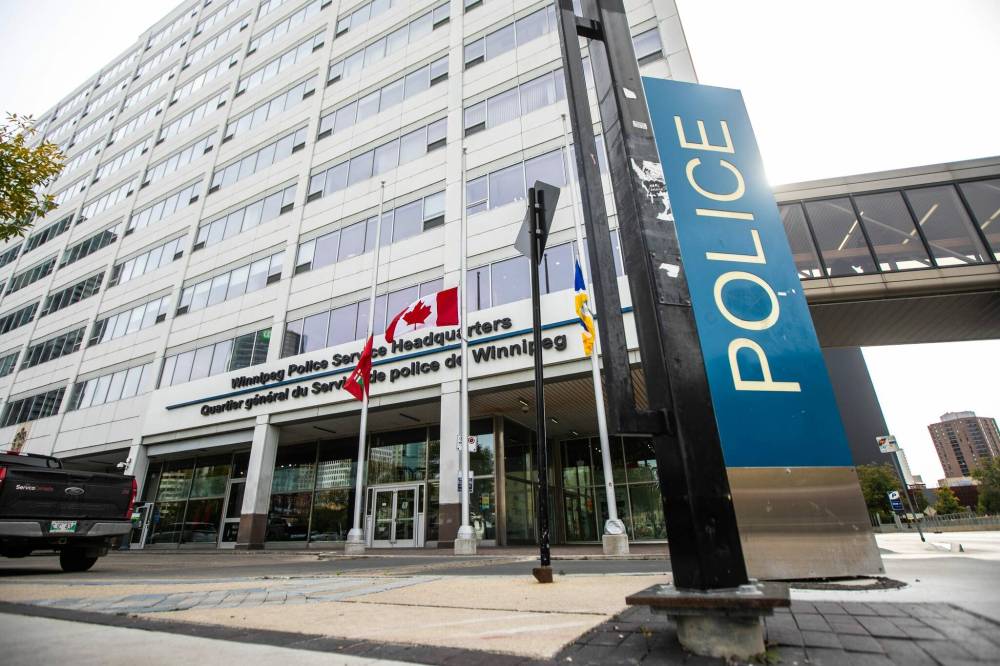There’s little doubt an expanded police presence in downtown Winnipeg during major events would help people feel safer. It may even reduce some crimes, such as vehicle break-ins and possibly some violent offences, like robbery and assault.
The question is, where would the Winnipeg Police Service, which is already relying on record levels of overtime, find the officers to do so?
WPS Insp. Helen Peters held a news conference last Friday to discuss plans to add more cops downtown during large events, such as Winnipeg Jets games, concerts and conferences. Police have, for years, deployed extra officers in the core area during those events. But with violent crime and property offences on the rise in the city, police brass are planning an even more robust presence.

Winnipeg Police Service headquarters (Mikaela MacKenzie / Free Press files)
Downtown crime was up 15.9 per cent last year compared with the previous five-year average, according to the WPS 2023 annual statistical report. Property crimes downtown rose 14.2 per cent compared with the five-year average and violent crimes were up 39.2 per cent using the same measurement.
“As police officers, we’re so often caught in that cycle of responding to events after they’ve happened and what we really want to do is be a proactive resource and support,” said Peters.
But where would the additional officers come from? Winnipeg’s police complement is smaller today than it was a decade ago, yet calls for service have been growing steadily during that time.
There were 1,463 authorized Winnipeg police officers on the job in 2013. There were only 1,366 in 2023. Winnipeg’s population during that period grew from 695,436 to 815,599.
Meanwhile, total calls for service to police increased to 783,248 last year, up from 618,321 in 2018. Total dispatched events were also up 6.2 per cent compared with the previous five-year average. All categories of dispatched events (emergency, urgent, non-urgent) increased during that period.
There are more people to police in Winnipeg, yet fewer cops to do it.
Some possible solutions have been proposed. Police could limit the amount of special-duty officer jobs it allows (where cops are rented out to private and sometimes government organizations to provide light policing duties, such as directing traffic or monitoring retail stores). But it wouldn’t do much to free up police resources, since special-duty jobs are voluntary for officers and are scheduled outside of their normal shifts.
Special-duty policing is also a lucrative revenue stream, which helps defray the cost of policing. Any move to cap its use would have a revenue implication for city hall.
Still, the demand for special-duty policing has been growing in recent years and there is likely a threshold where increased use could cause officer burnout for some.
WPS Supt. Dave Dalal said last month the service “continually needs to reassess” whether it can meet the growing demand of special-duty policing.
Either way, making changes to special-duty policing would likely have little effect on the current officer shortage. The service is relying more and more on overtime to fill shifts, which comes at a great cost to taxpayers. WPS brass said it needs 78 more officers to respond to the growing number of calls for service.
It seems increasingly clear that the WPS will have to hire more cops to police Winnipeg effectively, especially if it wants to expand coverage downtown during major events (and respond to other crime hot spots, such as retail theft and a rise in violent crime).
The question that still hasn’t been answered is who would pay to expand the police force? The City of Winnipeg has no fiscal wiggle room to do it on its own. It is running structural deficits and has nearly drawn down its financial stabilization fund. Adding more cops to the police force would likely require additional funding from the provincial government, or a significant property tax increase. Or both.
Expanding the police force would just be a stopgap measure; it wouldn’t get to the root causes of growing crime in the city. It would merely be a short-term response to it. Governments have to do far more to address poverty, homelessness, addictions and mental health if it wants to combat crime in the long run. Both the city and the province are doing some of that, but more is required.
In the meantime, for the safety of the community, Winnipeg will probably have to bring the size of its police complement back to where it was 10 years ago. Even if it did, it would still be smaller, per capita, than it was in 2013.
As for who would pay for it, the province and the city will have to sit down and figure that out.
tom.brodbeck@freepress.mb.ca

Tom Brodbeck
Columnist
Tom Brodbeck is a columnist with the Free Press and has over 30 years experience in print media. He joined the Free Press in 2019. Born and raised in Montreal, Tom graduated from the University of Manitoba in 1993 with a Bachelor of Arts degree in economics and commerce. Read more about Tom.
Tom provides commentary and analysis on political and related issues at the municipal, provincial and federal level. His columns are built on research and coverage of local events. The Free Press’s editing team reviews Tom’s columns before they are posted online or published in print – part of the Free Press’s tradition, since 1872, of producing reliable independent journalism. Read more about Free Press’s history and mandate, and learn how our newsroom operates.
Our newsroom depends on a growing audience of readers to power our journalism. If you are not a paid reader, please consider becoming a subscriber.
Our newsroom depends on its audience of readers to power our journalism. Thank you for your support.